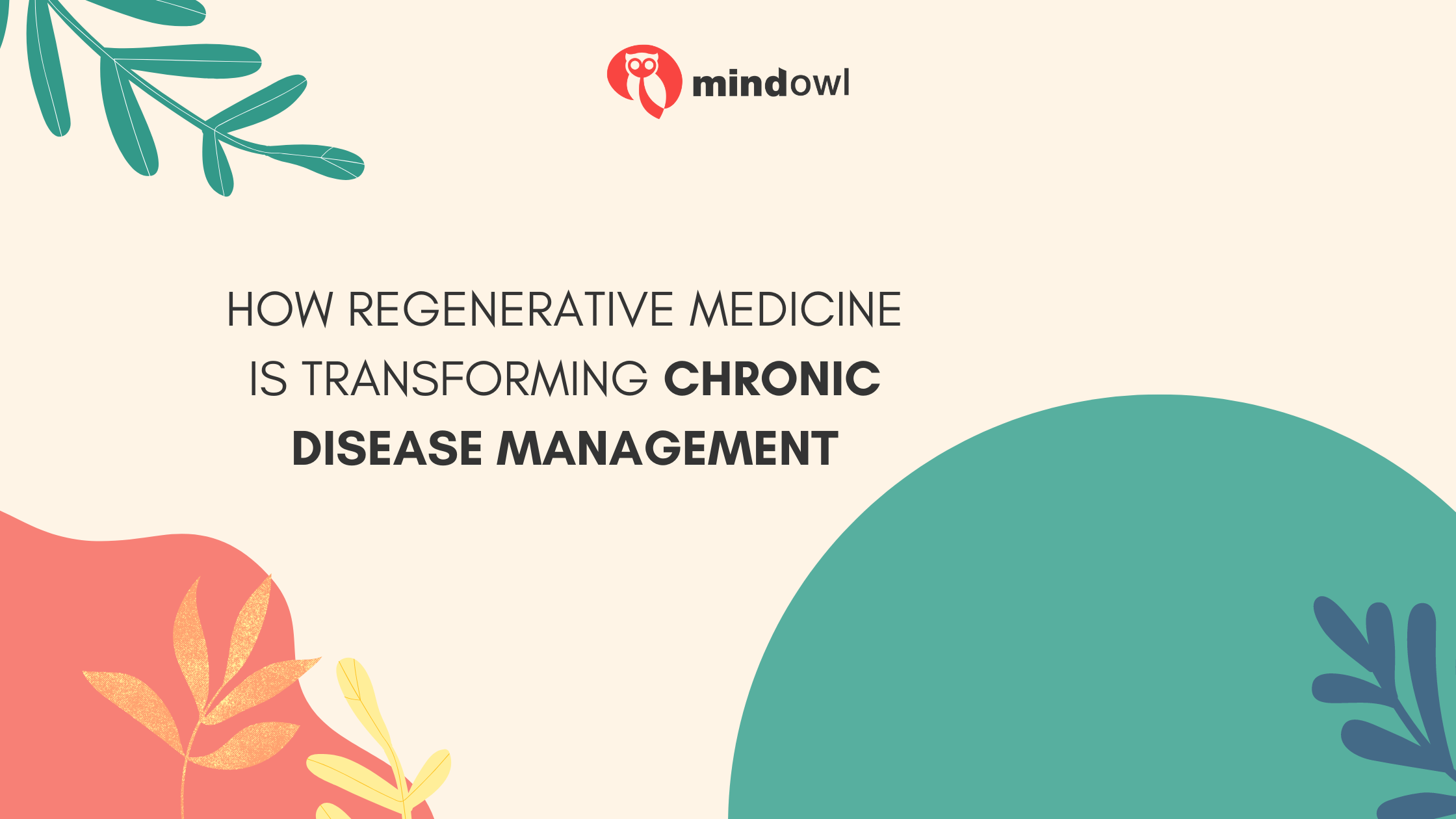Chronic diseases, including diabetes, heart disease, and arthritis, pose significant challenges to both patients and healthcare systems worldwide. Traditional medical approaches often focus on alleviating symptoms rather than addressing the root causes of these conditions. However, regenerative medicine is emerging as a revolutionary field that aims to transform chronic disease management by repairing and restoring damaged tissues and organs. This blog explores how regenerative medicine is reshaping the landscape of chronic disease management, highlighting recent advancements, their benefits, and the future potential of this exciting field.

What Is Regenerative Medicine?
Regenerative medicine is a rapidly evolving branch of medical science dedicated to the repair or replacement of damaged tissues and organs. It encompasses a variety of techniques, including stem cell therapy, tissue engineering, and gene editing. Unlike conventional treatments that often merely manage symptoms, regenerative medicine focuses on healing the underlying issues by regenerating damaged cells and tissues, offering new hope for patients with chronic diseases.
Stem Cell Therapy: A Groundbreaking Approach
Stem cell therapy represents one of the most promising advancements in regenerative medicine. Stem cells possess the remarkable ability to transform into various types of cells, making them ideal for treating chronic diseases. For instance, in conditions like osteoarthritis, stem cell therapy can be used to regenerate cartilage, potentially reversing the progression of the disease and providing lasting relief.
In the context of diabetes management, particularly type 1 diabetes, stem cell therapy holds significant promise. Researchers are exploring ways to regenerate the insulin-producing beta cells in the pancreas. If successful, this approach could potentially provide a cure by restoring the body’s natural ability to produce insulin, reducing the need for continuous insulin injections, and improving patients’ quality of life.
Tissue Engineering: Crafting New Solutions
Tissue engineering combines cells, biomaterials, and growth factors to create biological substitutes that can restore or improve tissue function. This innovative approach has wide-ranging applications, particularly in the treatment of chronic conditions. For example, in cardiology, researchers are developing bioengineered heart patches that can repair damaged heart tissue and enhance cardiac function, offering a potential alternative to heart transplants.
Similarly, tissue engineering is making strides in treating chronic wounds, such as those associated with diabetes. Advanced skin grafts created through tissue engineering can promote faster healing and reduce the risk of infections, which are common complications for patients with chronic wounds. These advances not only enhance patients’ quality of life but also help alleviate the strain on healthcare systems by reducing the need for extensive medical interventions.
Gene Editing: Precision Medicine at Its Best
Gene editing technologies, such as CRISPR-Cas9, represent a significant leap forward in the field of regenerative medicine. These technologies allow scientists to make precise modifications to genetic material, offering potential solutions for a range of genetic disorders. By targeting and correcting genetic mutations responsible for diseases like cystic fibrosis and muscular dystrophy, gene editing holds the promise of addressing the root causes of these conditions rather than merely managing their symptoms.
In addition to treating genetic disorders, gene editing has the potential to enhance regenerative therapies. For example, researchers are investigating how gene editing can be used to improve the effectiveness of stem cell treatment by enhancing the regenerative capabilities of stem cells themselves.
Personalized Medicine: Tailoring Treatments to Individual Needs
One of the most promising features of regenerative medicine is its ability to provide personalized treatment options. In contrast to traditional methods that typically use a universal approach, regenerative medicine customizes therapies based on an individual’s unique genetic profile, disease status, and overall health condition. This tailored approach not only enhances the chances of successful treatment but also reduces the risk of adverse side effects, resulting in more effective and safer therapeutic solutions.
Real-World Applications and Success Stories
The transformative impact of regenerative medicine is evident in several real-world applications. In the field of orthopedics, patients with severe knee osteoarthritis have reported significant improvements in pain relief and mobility following stem cell injections. These patients have experienced reduced reliance on invasive surgeries and pain medications, demonstrating the potential of regenerative therapies to offer more effective and less invasive treatment options.
In cardiology, experimental heart patches made from bioengineered tissues have shown promise in improving heart function in patients with heart failure. These patches help repair damaged heart tissue, providing a potential alternative to traditional heart transplants. The success of these experimental treatments highlights the potential for regenerative medicine to revolutionize the management of chronic cardiovascular conditions.
Addressing Challenges and Ethical Considerations
Despite the significant progress in regenerative medicine, there are several challenges and considerations that need to be addressed. One major hurdle is the cost of advanced therapies, which can be prohibitively expensive for many patients.
Ethical considerations also play a crucial role in the field of regenerative medicine. Issues related to stem cell research, gene editing, and the responsible use of these technologies must be carefully navigated to ensure that advancements are made in an ethical and responsible manner. Maintaining public trust and adhering to ethical guidelines are essential for the continued progress and acceptance of regenerative medicine.
The Future of Regenerative Medicine
Ongoing research and technological advancements are expected to refine and expand the applications of regenerative therapies, potentially leading to new and innovative treatments for a wide range of conditions. Collaboration among researchers, clinicians, and policymakers will be crucial in overcoming existing challenges and translating breakthroughs into widespread clinical practice.
As regenerative medicine continues to evolve, it has the potential to transform the approach to chronic disease management. By shifting the focus from symptom management to addressing the underlying causes of diseases, regenerative medicine offers the possibility of more effective and long-lasting treatments. This shift could significantly improve patients’ quality of life and reduce the overall burden on healthcare systems.
Conclusion
Regenerative medicine is reshaping the management of chronic diseases by offering innovative approaches that focus on repairing and restoring damaged tissues rather than merely managing symptoms. While challenges remain, the continued progress in regenerative medicine promises a future where chronic diseases can be managed more effectively, potentially leading to cures and significantly enhancing the quality of life for patients. As this field advances, it has the potential to revolutionize the standard of care and offer new possibilities for those living with chronic conditions.
MindOwl Founder – My own struggles in life have led me to this path of understanding the human condition. I graduated with a bachelor’s degree in philosophy before completing a master’s degree in psychology at Regent’s University London. I then completed a postgraduate diploma in philosophical counselling before being trained in ACT (Acceptance and commitment therapy).
I’ve spent the last eight years studying the encounter of meditative practices with modern psychology.

